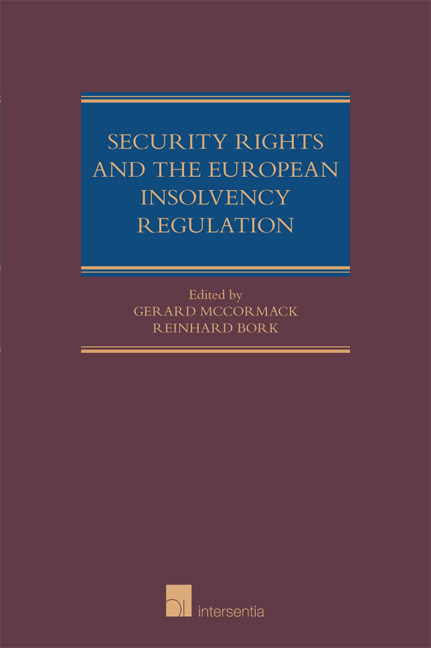Preface
Published online by Cambridge University Press: 21 September 2018
Summary
This book arises out of a research project that was very generously funded by the European Commission under the Civil Justice Action programme – grant JUST/2013/JCIV/AG/4631. We thank the European Commission for their funding.
The events of 23 June 2016 may cast a long shadow but we hope that they do not dim unduly the prospects for further European scientific research and cooperation.
This book is very much a team effort led by Gerard McCormack at the University of Leeds in the UK and including Reinhard Bork at the University of Hamburg in Germany, Laura Carballo Pineiro and Marta Carballo Fidalgo at the University of Santiago de Compostela in Galicia, Spain, Renato Mangano at the University of Palermo in Italy and last, but certainly not least, Tibor Tajti at the Central European University, Budapest, Hungary.
The book aims to analyse critically the provisions governing rights in rem (security rights) and transactional avoidance in the European Insolvency Regulation – now Regulation 2015/848 – and to address whether there is scope for reform of the law. Security rights are essentially rights over property intended to secure payment of a debt or other obligation. They are of fundamental importance to the granting of credit and are generally considered to increase the availability and lower the costs of credit with concomitant benefits for both debtors and the overall economy. But there are divergent views on the extent to which it should be possible to create and enforce security rights over assets.
The book also:
– assesses the extent of the protection given to security rights under the main EU legal traditions;
– evaluates the policy reasons behind protection;
– elaborates whether, and to what extent, this protection also applies in the context of insolvency proceedings affecting the debtor;
– assesses whether, and under what conditions, security rights created prior to the institution of insolvency proceedings can be set aside in those proceedings;
Moreover, it considers the need for further European harmonisation.
The first part of the book expounds common themes and ideas and suggests possible law reform measures.
- Type
- Chapter
- Information
- Security Rights and the European Insolvency Regulation , pp. vii - xPublisher: IntersentiaPrint publication year: 2017

